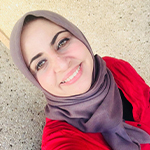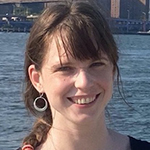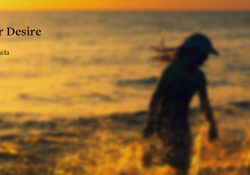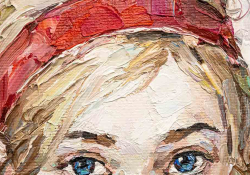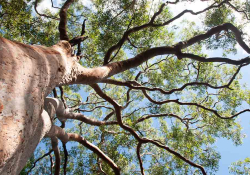Malak’s Shadow
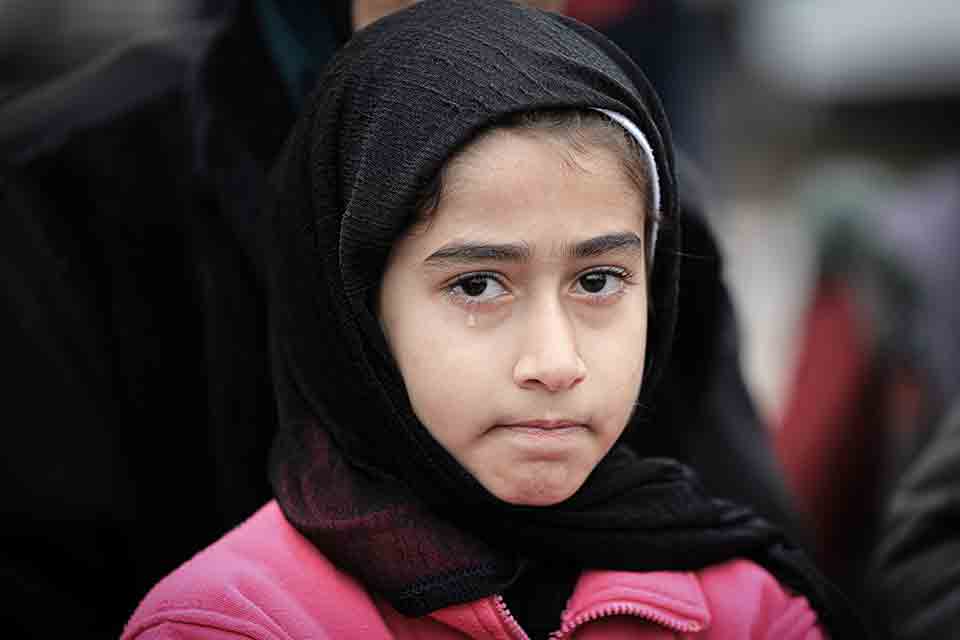
He was standing stiffly in the middle of one of the hospital’s rooms and looked like a small saint who had walked out of battle, with a miserable face and eyes that had lost their glow. His cheeks were splattered with a large amount of blood, and his trembling hands indicated what this little boy only three years old had lived through. His hair was matted, full of dust and dirt, and his shirt was coated with rock and dust drenched in dark-red blood, mixed with some of the fragments of shredded flesh that were all over his body; his feet were the color of coal and had been stripped of any covering. He looked as if he were in another time, unaware of what was happening around him after the heart-slapping brutality of what he had seen.
Behind him, in a corner of the room, was an injured man on the floor, with one of his relatives standing next to him and another holding his bag of IV fluid. In another corner, split-open corpses lay stacked together like a notebook whose contents bore no relation to life; the corpses weren’t even all in one place, but flung about in the haste of trying to ascertain the identities of the dead. In front of the little boy were his brothers, spread out on the floor and spotted with their own blood; he doubted he would be able to tell them apart with their appearance altered this way. Anas and Mahmoud did not turn toward him. There was a large body spread out next to them that had kissed him the evening before, several hours before the massacre; it looked like his father, who had just been alive. And, where he couldn’t let his gaze rest for long, someone who looked like his mother, but also like a dry tree covered in blood and blackness.
* * *
Mehdi, the little boy, was trembling like a bird dampened by fire, unable to grasp what was happening around him. He had been asleep in his mother’s bosom; she had kissed him and wrapped him in her arms because he was the youngest of her children. For this reason and because of the bitter cold in a tent that was barely a strip of fabric patched with nylon, his mother made use of her body to warm him. The family had been coercively displaced from their home when the amoral planes shelled it, and they found their feet taking them, like hundreds of the displaced, to Al-Mamdani Hospital in Gaza. Tents were packed together in the hospital courtyard next to some cars, and wherever there was space another family was appended, and then another, until the hospital courtyard became a shelter for the displaced women, men, and children, after they had escaped with their lives and walked hundreds of kilometers to arrive at this place that one might think was safe—because who, in an extremely civilized world, would dare to bomb a hospital?
Who, in an extremely civilized world, would dare to bomb a hospital?
The minutes passed heavily for Mehdi, who remembered in a fleeting moment that he had a sister named Malak but didn’t see her here, killed with the rest of his family. All he remembered of his last few hours was that he was feeling cold and crying, in the early hours of the morning, for his mother to cover him up and hold him close to her; she had made her hands his heater with her habitual up-and-down motion on his back to warm him up, whispering, “I love you, Mehdi . . . sleep, my love, the sun will rise in a few hours.” With their cheeks pressed together, he whispered, “Mama, will we go back home and find Lola the cat?” He felt her smile as she answered, with sleep overtaking her, “We’ll find her waiting for us . . . sleep, little one.”
* * *
Mehdi had fallen asleep with his mother squeezing his small body, and now he couldn’t move. The sun was very bright, or at least it seemed that way to him; daylight had broken, turning the blackness of night into a raw, blinding light. He cried out from the brightness and a terrible smell began to spread, almost cutting off his breath. Could his mother’s embrace be this tight, almost suffocating him? He heard shouting, wailing, and the lethal din of an attack, this little boy only three years old—what would he understand from his mother no longer speaking? His breaths began to quiet; human fragments had landed on top of them, and deadly shrapnel mixed with iron rods, stone, and the rubble that had formed an unyielding foggy cloud. He wanted to scream for his mother, but she was still holding him to her chest, and her hands had dried up against his small body.
His breaths were constricted as he tried in vain to cry out, “Mama! Mama, I’m suffocating!”
His scream was muffled; the noise and terror around him made his small voice into a whisper unheard by the universe. The slaughter had dispersed the displaced in the Al-Mamdani hospital courtyard and terror pervaded the place, the screaming of children and the wailing of men and women, everyone feeling their body, their head, hands, and feet, everyone gathering the remains of their families’ limbs. What rockets are these that turn humans into a pile of flesh and dust, some of them headless and others screaming in terror at the sight of their loved ones? He started to run, confused, over the corpses to flee from this hell; blood pooled in every corner, and the dust and fog spread, and the smell of blood and fresh meat filled the air. The carts were lit up with fire, and the white of the ambulances in the hospital courtyard was mixed with bright red, and all the faces were pale from the horror of the trauma.
The noise and terror around Mehdi made his small voice into a whisper unheard by the universe.
* * *
The little boy suddenly screamed, and a doctor came running to pick him up and put him on a newly empty bed, where he began to inspect the shrapnel that filled his body. Mehdi was petrified. The doctor asked him his name, but the little boy had been struck dumb by the horror of what he had seen.
His mother had been holding him tight and had been killed when exploding shrapnel hit her in the back, which was now a gaping hole, a large void in this cold world. Her back was ripped open by the bombing, and her legs and head were torn apart, but her hands kept protecting her little one even after the life had left her. The little boy tried to cry, to shout, but he was small in the face of death, small in the face of life. One of the first responders scooped him up, whooping and shouting, “A living child! A living child, rescue him!”
Another first responder rushed to the side of this one to help extract Mehdi from his mother’s embrace, but even in death she refused to let him go until the little boy passed out from terror. This was his last sight of his mother and his last hug from her. The first responder carried him away, crying, while moaning and screams lit up every corner of the hospital square.
* * *
The hospital was packed with death, full to the brim with corpses and the injured and afflicted, hundreds of martyrs of an underhanded moment in time: the Al-Mamdani Hospital Massacre in which Mehdi lost his mother, who protected him with her body as if she knew that it would be his final life preserver.
The hours passed heavily, and he spent the night staring into the darkness and faint lights, hearing the moaning of the injured and the screaming of the wounded, a little boy too small for this terror. The sun, which he had been waiting for to warm him, rose; meanwhile, the sun and tree of his family had been extinguished in an act of treachery from the large world, of which he had seen nothing but Gaza. He didn’t even know Palestine, his country. How could a child like him have seen Palestine, born under siege and living barely three years under military aggression and war, and then genocide?
One of the nurses standing nearby tried to calm him down a bit, showing him pictures of her children on her phone, but he just stared at length at the ceiling until suddenly Malak entered the hospital, screaming his name and searching for him like someone stung with venom.
He sat up despite his injuries and stared at this angel who swooped down to hug and kiss him and shouted, sounding older than her age, “My love, my love, Mama left you behind for me because I’m all by myself! My love, Mehdi, you’re alive, my brother! You’re all I have left.”
Malak’s shouting drew over everyone around them, tears flowing even from the wounded hunched over their crutches as they gazed at these children, Malak and Mehdi, overpowered by sadness and loss because all of them had lost someone dear to them; all of them had lost loved ones. Some entire families had been killed in the massacre, with not a single person remaining.
* * *
Malak was waiting for the displaced people around her to go to sleep so that she could find a free spot inside the hospital to charge her phone, because there was no electricity in the courtyard tent. She went and sat near the clock to use the socket there, following with her eyes the injured and their weak movements as their companions tried to support them. Her eyes filled up with tears when she saw a grandmother holding up her grandson, barely walking herself as he leaned on her shoulder. The grandson had lost his father and older brother and the family was separated now, none of them knowing where the others were. Malak felt sad for this aged grandmother and her grandson, and wished from the bottom of her heart to help them. She picked up her phone and headed toward the grandmother she had never met before, asking, “Do you want help, Grandma?”
The old grandmother smiled, standing with one hand on her right knee: “My dear, who are you here with?”
Malak said, “My whole family evacuated after they bombed our house and my uncle was killed, and we had nowhere else to flee to.”
The grandmother nodded and said, “The mother of all Nakbas, little one, this is the mother of all Nakbas. What I saw when I was young, about your age, wasn’t even a speck of what we’re living through now.”
She sighed and continued on her path, and her grandson muttered, “This is Gaza, my girl . . . this is Gaza. If they only knew!”
“This is the mother of all Nakbas.”
Then the grandmother passed by, waving to Malak: “May God protect you, my dear, no thank you . . .” Her voice broke off as the floor of the hospital shook and a series of giant explosions rained down that felt as if they were inside Malak’s heart. Everyone around her fell to the ground, flattening themselves with their hands covering their heads as shouting, dust, and the sound of continuous blasts filled the hospital. This was no ordinary day; it was pivotal.
Mehdi clung to Malak’s embrace and began to comprehend that she was alive and that he could smell his mother’s scent in her clothes. An almost-smile appeared on his face at the blouse Malak was wearing, which was actually his mother’s; when they had been forced to flee from their house, escaping with their lives from its bombing, his mother had been wearing it over her other clothes.
Malak was a troublemaker, only fourteen years old, constantly pestering her older brother. Because she was the only girl in the family, everyone adored her and spoiled her. She was always craving her mother’s attention, wanting to spill all her stories from school to her. This was a lot of talking that Mehdi didn’t understand, but as soon as Malak came home from school, Mehdi, with his child’s intuition, would rush to his mother’s bosom, as if Malak had come to compete with him for their mother’s love, and the two of them would meet in their mother’s arms.
“My loves!”
Mehdi would hang on his mother’s hair and neck, and Malak would tickle him until he burst out laughing, his arms slackening from the force of his laughter, and she would rush into their mother’s arms, but then he would nudge his way back in. This is how they could be found every day when Malak got home from school.
The little boy remembered his mother’s blouse and her scent; how Malak had loved to dress up in her mother’s clothes, wanting to grow up quickly to be just like her. It was almost as if little Malak had known that she would have to become a mother to her little brother.
After being treated in the hospital, Malak and Mehdi went out to join the other displaced people heading south. They walked like a tree and its shadow, with her smiling at him and him smiling back at her even though they were aching with hunger, thirst, and exhaustion. Their feet were bare and their eyes fixed on the throngs of displaced people walking south for many hours, surrounded on all sides by Israeli tanks that repeatedly obstructed their movement, with the sound of bullets all around them and emptiness staring them in the eyes. There were mothers and fathers walking with their children between them, some of them carrying small bags but most of them not having been able to bring any of their belongings with them—this was fleeing from hell.
* * *
The two of them gazed at each other; looking at them, you would see a family with a long shadow. They sat in a threadbare tent, but many hands had reached out to help them in their life without family . . . a small tent without windows or doors, a tent in which they sat alone, Mehdi wrapped in his sister’s shadow, with her smiling at him like a mother who had sprung down from the sky.
He played with her long hair and smiled, saying—having gone back to speaking after remaining mute for many months—“Malak, you look like Mom.”
She pulled him to her small chest, with tears streaming from her eyes. He stroked the locks of her hair, asking, “Why are you crying?”
Malak calmed down a bit and shook her head.
He smiled and said, with a calm she didn’t recognize in him, “I’m going to grow up tomorrow and be taller than you.” Enfolding himself in her small arms, he whispered, “I’ll warm you in my shade when I grow up!”
Translation from the Arabic
Author’s note: This story is dedicated to “Malak” and “Mehdi,” who survived the hell of the genocide in Gaza after losing everyone in their family in the Al-Mamdani Hospital Massacre, which is also known as the Al-Ahli Arab Hospital Massacre, a slaughter committed by Israeli warplanes that attacked Al-Ahli Arab Hospital / Al-Mamdani Hospital in the Zeitoun neighborhood in the south of Gaza City in the early hours of the night of October 17, 2023. The bombing martyred more than five hundred Palestinians, most of them women and children using the hospital as a shelter from Israeli attacks.

